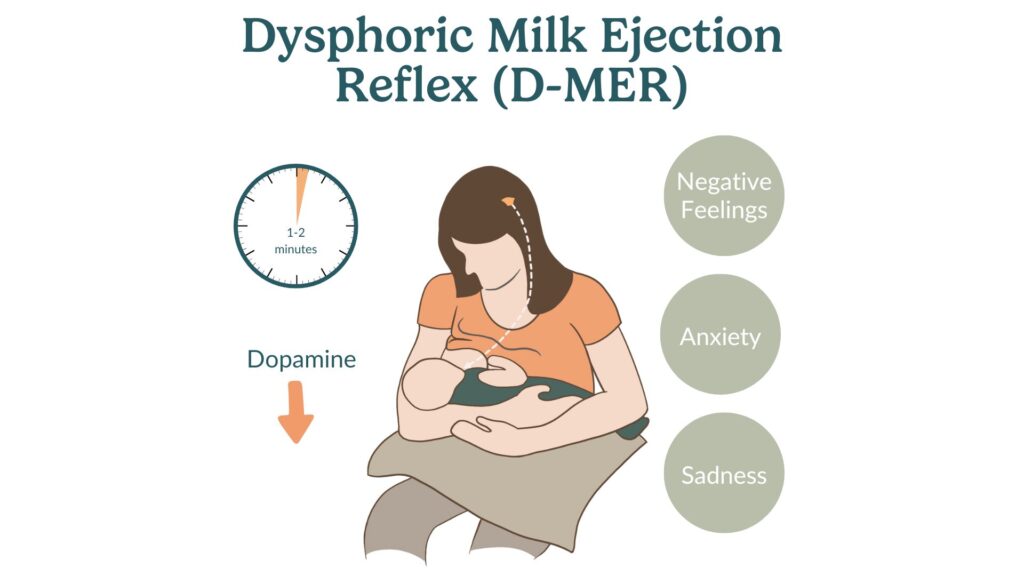dysphoric milk ejection reflex

Dysphoric Milk Ejection Reflex (D-MER)
Dysphoric Milk Ejection Reflex (D-MER) is a condition that causes sudden and intense feelings of sadness, anxiety, or other negative emotions just before your milk let-down occurs. These feelings usually last for a minute or two and subside as the milk starts to flow. It is related to a sudden drop in the hormone dopamine during the let-down for some moms.
Unlike postpartum depression or anxiety, D-MER is directly tied to the hormonal changes that happen during milk ejection.
What to watch out for
If you suspect D-MER, here are some signs and tips to help you identify and manage it:
- Emotional shifts: Look for sudden waves of negative emotions, like sadness, anxiety, or irritability, just before let-down. These feelings resolve quickly (within a few minutes) and are unrelated to your thoughts or external situations.
- Patterns during feeding or pumping: D-MER is typically consistent and happens during each let-down. If you notice a recurring pattern, it may help confirm the condition.
- Impact on feeding: While D-MER itself doesn’t interfere with milk production, the distress can make breastfeeding feel emotionally challenging. Awareness and coping strategies can help make the experience more manageable.
Managing D-MER:
Some moms with D-MER experience these feelings with every letdown throughout their entire breastfeeding journey. Others notice the negative emotions significantly decrease after a few months. Some moms find the following ideas helpful if your goal is to continue breastfeeding with D-MER:
- Set a timer when the letdown starts: knowing that the feelings will be gone within a few minutes can help you cope and know it’s temporary
- Turn on your favorite show or song during breastfeeding sessions: to combat the dopamine drop, turn on something that makes you feel good! Your favorite episode of The Office or a song that always makes you want to dance can help that dopamine drop not feel as intense.
- Keep a favorite snack nearby: some people experience an increase in feel-good hormones when they eat their favorite foods. Some moms will eat a chocolate bar or snack on some yummy chips during the letdown to distract them from the negative feelings.
Physical limitations or health circumstances
D-MER is believed to be caused by a temporary drop in dopamine, a chemical in your brain that affects mood, during the release of oxytocin for milk let-down. Certain factors may influence or intensify D-MER:
- Stress or sleep deprivation: These can exacerbate hormonal imbalances, making symptoms feel stronger.
- Previous mental health concerns: A history of mood disorders doesn’t cause D-MER, but it might make it harder to cope with its effects.
- Frequent let-downs: If you’re breastfeeding, pumping often, or experiencing overactive let-downs, you may notice the emotional shifts more frequently.
If D-MER feels overwhelming or interferes with your ability to breastfeed, consult with a lactation consultant or healthcare provider.
Other terms
Understanding related terms can help you better manage D-MER and breastfeeding:
- Let-down reflex: The release of milk triggered by your baby’s sucking or by pumping. D-MER occurs just before this reflex.
- Oxytocin: The hormone responsible for milk ejection. Its release is paired with a drop in dopamine, which contributes to D-MER.
- Dopamine: A brain chemical that affects mood. A temporary dip in dopamine is thought to trigger D-MER.
- Overactive let-down: A fast or forceful milk flow, which may increase the frequency of emotional shifts in mamas with D-MER.
- Breastfeeding and mental health: It’s important to monitor how breastfeeding impacts your emotional well-being and seek support when needed.


